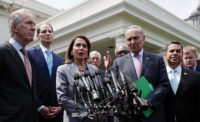Construction equipment makers, home builders, steelmakers and organized labor are praising a new agreement between House Democrats and President Trump's chief trade negotiator on a successor to the North American Free Trade Agreement.
But environmental groups are unhappy that the plan omits climate standards.
The deal would seem to put to rest Trump's threat to pull the U.S. out of NAFTA without a new agreement in place, a move that a construction economist says would have caused uncertainty for businesses could have led to companies' holding off on construction plans.
The agreement, which House Speaker Nancy Pelosi (D-Calif.) and other party colleagues announced on Dec. 10, was signed by officials from Canada and Mexico and the U.S. the same day. The House passed it on Dec. 19 by a 385-41 vote. Senate consideration would follow in the new year.
Pelosi said at a press conference in the U.S. Capitol that in the new agreement, Democrats sought tougher provisions to enforce the agreement and language to protect the rights of U.S workers. [View transcript of press conference here.]
Pelosi said the pact, which has been dubbed the U.S.-Mexico-Canada Agreement, or USMCA, is “infinitely better” than the Trump administration’s earlier proposal.
House Ways and Means Committee chairman Richard Neal (D-Mass.), a leader of the Democrats’ negotiating team, said that, for his side, a critical element was “enforceability, enforceability, enforceability.”
The agreement won the backing of AFL-CIO President Richard Trumka, whose views were crucial in the trade debate. Trumka said in a statement that “we have secured an agreement that working people can proudly support.”
Trumka added that the new agreement “is a vast improvement over both the original NAFTA and the flawed proposal brought forward in 2017.”
He cited the deal’s “enforceable labor standards—including a process that allows for the inspections of factories and facilities that are not living up to their obligations.” The AFL-CIO did hedge slightly, saying that it wants to see that the final text of the agreement contains changes that are reported to be in it.
Rep. Jimmy Gomez (D-Calif.), another negotiator, highlighted language in the pact that would establish “monitoring mechanisms to assess Mexico’s progress in implementing its labor reforms and complying with the rules that we laid out in writing.”
Gomez, who formerly worked for the American Federation of State, County and Municipal Employees' nurses' union, added that the agreement an “enhanced labor-specific enforcement mechanism that will support and ensure that violation of the agreement standards will have real-world consequences.”
“I think this is a big win,” Gomez said. “This is no longer ‘NAFTA Lite’.” That was a label critics had applied to an earlier proposal.
Rep. Suzanne Bonamici (D-Ore.) added that the final deal also includes "better rules" on environmental issues, including "several multilateral agreements."
But major environmental groups criticized the new agreement. Sierra Club Executive Director Michael Brune said in a Dec. 11 statement that the deal "appears to fall far short of the fundamental changes that Democrats and environmental groups have consistently said are needed to curb NAFTA's environmental damage." Brune cites an apparent lack of climate standards and air and water pollution limits.
Industry officials voiced support for the agreement. Thomas J. Gibson, American Iron and Steel Institute president and chief executive officer, praised the trade news. He said in a statement, “Implementation of the USMCA is critical to strengthening the steel industry’s competitiveness in the face of the continued challenges from global excess capacity and weakening demand.”
Association of Equipment Manufacturers President Dennis Slater said in a statement, “Getting this across the finish line will preserve duty-free market access to our most important trade partners, add more than $68 billion to the U.S. economy and create 176,000 U.S. jobs.”
AEM notes that NAFTA, which went into effect on Jan. 1, 1994, has benefited heavy-equipment makers through duty-free access to Canada and Mexico, that industry’s two largest export markets.
The National Association of Home Builders also hailed the deal. NAHB pointed out that U.S. home building and renovation draws on “tens of billions of dollars” a year in Canadian and Mexican exports of construction materials, such as softwood lumber, steel and aluminum.
The association added, “The price volatility of these imported materials and equipment [is] needlessly driving up housing costs and exacerbating the nation’s housing affordability woes.”
Ken Simonson, Associated General Contractors of America's chief economist, said via email, "If President Trump had followed through on withdrawing from NAFTA in the absence of a new agreement, I think the consequences would have been disruptive for many industries."
Simonson added, "At a minimum, uncertainty about future impacts would have caused many manufacturers, agricultural and food-processing businesses, transportation and logistics companies and border communities to freeze or delay plans to invest in many types of structures."
Talks between Democrats and the administration’s top negotiator, U.S. Trade Representative Robert Lighthizer, were difficult.
“These were intense, argumentative, angry negotiations,” Neal said. “I think we set a world record for hanging up on each other, myself and the Trade Rep." He added, "But at the same time, we also knew that this was an opportunity that we couldn’t let get away from us.”
Lighthizer said in a statement that the new agreement "will benefit American workers, farmers and ranchers for years to come." He added, "This will be the model for American trade deals going forward."
Story updated on 12/19/19 with House floor vote.





Post a comment to this article
Report Abusive Comment